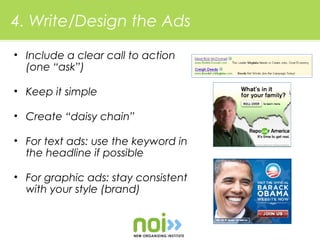Presentation online-advertising-toolbox
- 1. Online Advertising (Thanks to Andrew Bleeker for some of this great content)
- 2. What We’ll Cover • Advantages • Objectives • Glossary • Types of Advertising • Step-By-Step Guide
- 3. Advantages of Online Advertising • Adaptability • Accountability • Targeting • Interactivity • Efficiency • Rapid Response Screenshot from http://www.leftyblogs.com
- 4. Objectives • List-building/offline action – Empower supporters and provide a way to take action • Rapid response – Respond to breaking news • Messaging & persuasion – Provide compelling and interesting content – Move a message Video ad unit
- 5. Glossary of Terms • Cost Per Click (CPC) / Pay Per Click (PPC) – Advertisers only pay when a user clicks the ad and is directed to the website – Useful when user destination is most important • Cost Per Mille (CPM) / Cost Per Impression (CPI) – Advertisers pay for exposure (view) of their message to a specific audience – Per Mille means per thousand impressions (or number of times an ad loads on the page) – Useful when user education is most important
- 6. Types of Advertising • Search / contextual • Social networks & blogs • Banner ad networks • Individual site placements
- 7. Search / Contextual • Advantages • Disadvantages – Can target people who – Generally low-impact are interested in the – Hard to scale because material only so many people are – Pay only on an efficient searching for any term “cost per click” basis – Largely driven by news – Generally low-risk cycles and earned – Set what you are willing to media, so pay-off is hard pay by bidding to predict – Hard to do well without being time-intensive
- 8. Search / Contextual Example Paid search results based on keyword. Organic search results. Can’t pay for a higher ranking.
- 9. Social Networks & Blogs • Advantages • Disadvantages – Large pools of like- – Sensitivity of political minded supporters blogs – Good way to join the – Low scalability conversation and get – Poor ad units earned media – Limited geo-targeting – Potential for viral or exponential spread – Advanced targeting abilities – In some cases, can also pay on a cost per click basis
- 10. Social Networks & Blogs Example
- 11. Banner Ad Networks • Advantages • Disadvantages – High reach – Limited control over – Pay only on a very placements efficient performance – Less valuable real estate metric – Potential for showing up – Extensive targeting on the wrong site abilities – Requires significant investment – Non-guaranteed inventory
- 12. Banner Ad Network Ordering Example Liberal Blog Advertising Network http://web.blogads.com
- 13. Individual Site Placements • Advantages • Disadvantages – Target specific content – Exclusively sold on a cost and placements per mille basis – Guaranteed inventory – Generally more – Control your share of expensive voice (SOV) – Generally lower – Allows for advanced response rates targeting: ad – Varying minimum buy sequencing, frequency requirements capping, etc. – Requires contracting directly with each publisher – No longer self-serve
- 14. Site Example
- 15. Getting Started 1. Create a Plan 2. Identify the Platforms & Targets 3. Set a Budget 4. Write/Design the Ads 5. Track & Optimize
- 16. 1. Create a Plan • What are your goals? Who’s your audience? • What do you want to communicate? What’s your message? • What’s your ultimate objective? How will you know if you’re successful? • Create a calendar and incorporate/identify – All ad buys/advertising – Messaging campaigns (volunteering, fundraising, email blasts) – Important dates and key milestones
- 17. 2. Identify the Platforms & Targets • Platforms – Google Adwords – Facebook Ads – MySpace Ads • Targets – Location – Demographics – Keywords – Specific dates
- 18. 3. Create a Budget • How much money do you have to spend? • What’s the timeline for your campaign? • Do you want to allocate more money around your important dates? • How much are you going to spend on each advertising platform?
- 19. 4. Write/Design the Ads • Include a clear call to action (one “ask”) • Keep it simple • Create “daisy chain” • For text ads: use the keyword in the headline if possible • For graphic ads: stay consistent with your style (brand)
- 20. 5. Track & Optimize • Monitor your initiatives and track the progress against your goals • Use an analytics tool or Excel spreadsheet • Change graphics, landing pages, keywords, demographics, or the ad buy as needed
- 21. 5. Track & Optimize • Don’t be afraid to try new things • Some metrics to track: – Impression rate – Click-through rate (CTR) – Interaction rate or Dwell rate • Spending time on an ad, including: mouse- overs, user-initiated video, and other user- initiated interaction
- 22. Contact Info New Organizing Institute (202) 558-5585 info@neworganizing.com www.neworganizing.com www.twitter.com/neworganizing





















